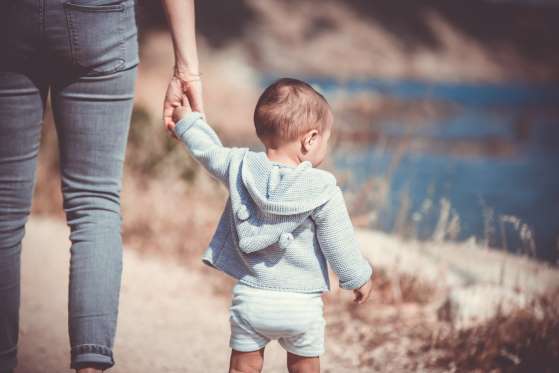Some might think of you as the quiet parent who keeps to themselves at the playground, but being an introverted parent has its perks. If you enjoy the calmer side of life – and revel in your alone time sans kids – then you’re in luck because according to experts, being an introverted parent can benefit both you and your little one.
Sophia Dembling, the author of Introverts in Love: The Quiet Way to Happily Ever After and Susan Krauss Whitbourne, a psychological and brain sciences professor at the University of Massachusetts and author of several books, including The Search for Fulfillment, agree that being an introvert certainly has its benefits in the wild and wonderful world of parenting.

THEY’RE EXCELLENT LISTENERS.
Being able to communicate effectively with your kiddo is at the tippy top of every parent’s list of priorities. And a huge part of communication relies on listening, a skill that introverts have a serious knack for. “Introverted people are very good listeners,” says Sophia, adding that they’re particularly good at dealing with kids who are also known for staying mum. “An introverted parent-child combination works wonderfully – the parent doesn’t freak out when the child wants to sit quietly in her room with a book.”

THEY TEND TO AVOID CONFLICT.
Don’t expect a whole lot of screaming and yelling from this bunch since introverts usually back away when conversations get tense. Sophia agrees, explaining that they “keep things to themselves and avoid conflict,” so if their child has a full-on meltdown at soccer practice, don’t be surprised if their response appears passive at first.

THEY’RE OFTEN IN TUNE WITH THEIR KIDS’ NEEDS.
Parents who are introverted usually can understand their kids’ feelings on a deeper level. “They tend to be more inward-oriented as the name [introvert] implies, and therefore, more thoughtful, more quiet, and perhaps more aware of their inner state,” says Dr. Whitbourne.

THEY’RE VERY SELECTIVE WITH WHOM THEY GIVE ATTENTION TO.
Introverts usually appear to be quiet and reserved on the surface, so it means that much more if they consider you to be an important person in their life. “Introverted people don’t need a lot of relationships and are selective about who they give their time and attention to, so they tend to be very loyal and invest deeply when they decide to invest,” explains Sophia. And who gets the most out of that deal? Their offspring, of course.

THEY LOVE NOTHING MORE THAN HANGING OUT AT HOME.
It’s true, some of the best memories can be made in your own backyard – and introverts know how to capitalize on that. Whether it’s cuddling up with a bowl of popcorn or doing wheelies in the driveway, home is an introvert’s favorite place to be. Sophia agrees: Your kids “will have someone to sit quietly on the couch with and someone who’s unafraid of silence.”

THEY DON’T TYPICALLY THRIVE IN CHAOTIC SOCIAL SITUATIONS.
As you can imagine, being in a crowded backyard with tons of screaming kids isn’t an introvert’s favorite activity in the world, but they make it work. “It can be a struggle for introverts to enjoy themselves at events like kids birthday parties, but thankfully there are plenty of extroverted parents who are jumping in, so they’re not going to stand out so much if they happen to blend a bit into the background,” says Dr. Whitbourne.
And that’s not necessarily a bad thing, she adds, saying “In fact, some people may regard the ability to blend into the background can be a good parenting trait because it may mean that you’re more kid-focused than self-focused.”

THEY’RE SURPRISINGLY WARM.
Although introverts aren’t in your face by nature, that doesn’t mean they’re unfriendly people. “Introverts can be as warm and caring and as interested in people as one can imagine,” explains Dr. Whitbourne. So the next time you see a quieter mama play group, make sure you reach out and say hello.












